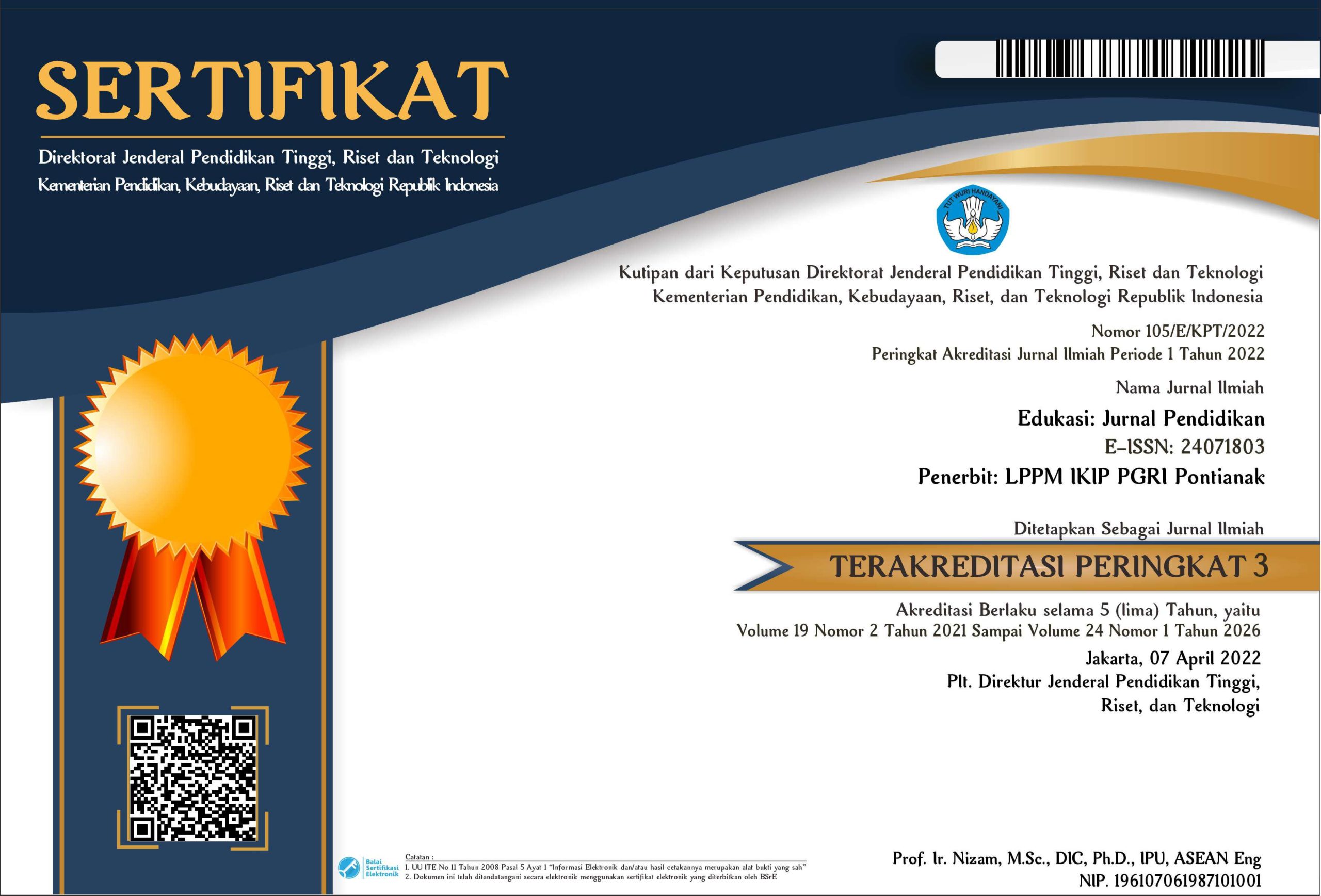Posisi Tawar Permendikbud Nomor 27 dan Urgensi Pendidikan Agama dalam Satuan Pendidikan
DOI:
https://doi.org/10.31571/edukasi.v19i2.3001Keywords:
aliran kepercayaan, multikulturalisme, Pendidikan Agama, Permendikbud Nomor 27, indigenous religion, multiculturalism, Religious Education, Permendikbud Number 27Abstract
Abstrak
Permendikbud Nomor 27 Tahun 2016 merupakan kebijakan yang dibuat untuk memfasilitasi penganut aliran kepercayaan agar mendapatkan hak pendidikan beragama dan berkeyakinan. Namun, praktiknya masih ditemui banyak kendala yang menghambat implementasi kebijakan tersebut. Kendala-kendala terlihat dari aspek kelembagaan, layanan, dan pemahaman stakeholder terkait. Hal tersebut menimbulkan pertanyaan seberapa efektifkah mata pelajaran Pendidikan Agama bagi generasi muda. Kajian yang ditulis bertujuan untuk mengelaborasi efektivitas Pendidikan Agama yang praktiknya mengarahkan peserta didik menjadi lebih eksklusif, termasuk dalam hal pendidikan kepercayaan. Masalah tersebut apabila dibiarkan akan menimbulkan ekses negatif kedepannya. Penulis merekomendasikan perubahan ke arah yang inklusif dalam kerangka pendidikan multikultural.
Â
Abstract
Minister of Education and Culture Regulation Number 27 of 2016 is a policy made to facilitate adherents of religious beliefs to get the right to education in religion and belief. However, in practice, there are still many obstacles that hinder the implementation of this policy. This obstacle can be seen from the institutional aspect, the service aspect, and the understanding aspect of the relevant stakeholders. This raises the question of how effective Religious Education subjects are for the younger generation in the current context. This paper aims to elaborate on the effectiveness of Religious Education which in practice directs students to be more exclusive, including in this case faith education. This problem if left unchecked will lead to negative excesses in the future. So this paper recommends a change to an inclusive direction within the framework of multicultural education.
Downloads
References
Adzkiya, U., & Fadhilah, I. (2020). Inklusi Sosial Penghayat Kepercayaan: Upaya Mendorong Hak Warga Negara Penganut Kepercayaan Sedulur Sikep Kudus. At-Taqaddum, 12(1), 91-101. https://doi.org/10.21580/at.v12i1.5622.
Banks, J. A., & Banks, C. A. M-G. (2016). Multicultural Education: Issues and Perspectives. Danvers: John Wiley & Sons, Inc.
Baskoro, A. (2020). Mewujudkan Social Inclusion: Kontribusi Satunama terhadap Penghayat Kepercayaan di Yogyakarta. Panangkaran: Jurnal Penelitian Agama dan Masyarakat, 3(2), 181-196. https://doi.org/10.14421/panangkaran.2019.0302-03.
Budijanto, O. W. (2016). Penghormatan Hak Asasi Manusia bagi Penghayat Kepercayaan di Kota Bandung. Jurnal HAM, 7(1), 35-44. https://doi.org/10.30641/ham.2016.7.35-44.
Bustami, A. L. (2016). Kepercayaan terhadap Tuhan Yang Maha Esa dan Tradisi dalam https://kebudayaan.kemdikbud.go.id/ditkt/wp-content/uploads/sites/ 6/2016/11/SOSIALISASI-PERMENDIKBUD-NO.-27_2016-Tentang-Layanan-Pendidikan-Kepercayaan-Tdp-Tuhan-Yme-Pd-Satuan-Pendidikan.pdf. Diakses 1 September 2021.
Hamudy, M. I. A., & Rifki, M. S. (2020). Civil Rights of the Believers of Unofficial Religions (Penghayat Kepercayaan) in Pekalongan District. Jurnal Antropologi: Isu-Isu Sosial Budaya, 22(1), 48-59. https://doi.org/10.25077/jantro.v22.n1.p48-59.2020.
Hernandi, A. (2016). Nilai-Nilai Ajaran Kepercayaan terhadap Tuhan YME sebagai Rujukan Pembentukan Karakter Bangsa dalam https://kebudayaan.kemdikbud.go.id/ditkt/wp-content/uploads/sites/6/2016/09/Makalah-ANDRI-HERNANDI-Nilai-Nilai-Kepercayaan-terhadap-Tuhan-YME-menjadi-Rujukan-Pembentukan-Karakter-Bangsa.pdf. Diakses 1 September 2021.
Instruksi Menteri Agama Nomor 4 Tahun 1978 tentang Kebijakan Mengenai Aliran-Aliran Kepercayaan dalam https://www.anri.go.id/download/ inventaris-arsip-tekstual-departemen-agama-19501998-1630545394. Diakses 1 September 2021.
Ketetapan MPR Nomor IV/MPR/1978 Tentang GBHN dalam https://peraturan.go.id/peraturan/view.html?id=11e458137d1ec49ea9b1303034323235. Diakses 1 September 2021.
Maarif, S., Mubarok, H., Sahroni, L. F., & Roessusita, D. (2019). Merangkul Penghayat Kepercayaan Melalui Advokasi Inklusi Sosial: Belajar dari Pengalaman Pendampingan dalam https://issuu.com/programpeduli/docs/ merangkul_penghayat_kepercayaan_melalui_advokasi_i. Diakses 1 September 2021.
Maulana, B., & Setyowati, N. (2019). Pemenuhan Hak Warga Negara oleh Negara (Studi Akses Pendidikan Kepercayaan bagi Peserta Didik Sekolah Menengah Atas Penghayat Kerokhanian Sapta Darma Cabang Surabaya). Kajian Moral dan Kewarganegaraan, 7(1), 196-210.
Mutaqin, Z. Z. (2014). Penghayat, Orthodoxy and the Legal Politics of the State: The survival of Agama Djawa Sunda (Madraisism) in Indonesia. Indonesia and the Malay World, 42(122), 1-23. https://doi.org/10.1080/13639811.2014.870771.
Peraturan Pemerintah Nomor 37 tahun 2007 tentang pelaksanaan UU No. 23 tahun 2006 tentang Adminduk dalam http://disdukcapil.purwakartakab.go.id/home/public/frontend/pdf/PP-NO-37-TH-2007.pdf. Diakses 1 September 2021.
Permana, A., Magiman, M. M., Science, F., & Putra, U. (2021). The Implementation of Educational Learning Services for the Penghayat Kepercayaan. İlköğretim Online, 20(3), 376-384. https://doi.org/10.17051/ilkonline.2021.03.36.
Permendikbud Nomor 27 Tahun 2016 tentang Layanan Pendidikan Kepercayaan terhadap Tuhan Yang Maha Esa pada Satuan Pendidikan dalam https://www.mlki.or.id/wp-content/uploads/2017/05/Pedoman-Impelentasi-FINAL-2-1.pdf. Diakses 1 September 2021.
Putri, U., & Pringgowijoyo, Y. (2020). Pemenuhan Layanan Pembelajaran Bagi Siswa Penghayat Kepercayaan Di Wilayah Dinas Pendidikan Kabupaten BantuL. Jurnal Kewarganegaraan, 4(1), 45-53. https://doi.org/10.31316/jk.v4i1.883.
Putusan MK Nomor 97/PUU-XIV/2016 tentang Demi Keadilan Berdasarkan Ketuhanan Yang Maha Esa dalam https://www.mkri.id/public/content/ persidangan/putusan/97_PUU-XIV_2016.pdf. Diakses 1 September 2021.
Ramadhan, Y. (2019). Pemenuhan Hak-Hak Anak Penghayat Kepercayaan Atas Pendidikan melalui Kurikulum Sekolah (Studi Kasus di SMK Negeri 7 Semarang) Skripsi: Universitas Katolik Soegijapranata Semarang. Tidak dipublikasikan.
Sholakodin, A. F. (2018). Implementasi Permendikbud No. 27 Tahun 2016 pada Warga Aliran Kebatinan Perjalanan di Kabupaten Tulungagung dalam http://karya-ilmiah.um.ac.id/index.php/Sosiologi/article/view/66350. Diakses 1 September 2021.
Suhadi, Yusuf, M., Tahun, M., Asyhari, B., & Sudarto. (2015). Politik Pendidikan Agama, Kurikulum 2013, dan Ruang Publik Sekolah. Yogyakarta: Program Studi Agama dan Lintas Budaya, Universitas Gadjah Mada.
Undang-Undang Dasar Republik Indonesia Tahun 1945 Pasal 29. https://www.bphn.go.id/data/documents/pkj_tumbuhnya_aliran_paham_keagamaan.pdf. Diakses 1 September 2021.
Undang-Undang Republik Indonesia Nomor 23 Tahun 2006 tentang Adminduk Pasal 105 dalam https://www.dpr.go.id/dokjdih/document/uu/ UU_2006_23.pdf. Diakses 1 September 2021.
Downloads
Published
How to Cite
Issue
Section
License
Authors who publish in this journal agree to the following terms:
- Authors retain copyright and grant the journal the right of first publication with the work simultaneously licensed under a Creative Commons Attribution License (CC-BY-NC) that allows others to share the work with an acknowledgment of the work's authorship and initial publication in this journal.
- Authors are able to enter into separate, additional contractual arrangements for the non-exclusive distribution of the journal's published version of the work (e.g., post it to an institutional repository or publish it in a book), with an acknowledgment of its initial publication in this journal.
- Authors are permitted and encouraged to post their work online (e.g., in institutional repositories or on their website) prior to and during the submission process, as it can lead to productive exchanges, as well as earlier and greater citation of published work.

 Download: 259
Download: 259


















